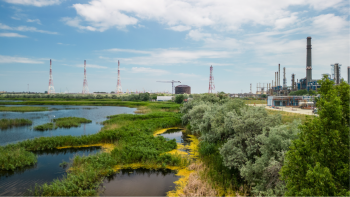Environmental, social, and safety goals
Rompetrol Energy operates in full compliance with all relevant environmental laws and regulations, guided by an integrated management system that includes specific environmental protection measures. These focus on minimizing environmental impact through water and waste management, the mitigation of greenhouse gas (GHG) and air emissions, and biodiversity conservation.
The Cogeneration Plant now meets the majority of the Petromidia platform’s energy needs. This results in a significant increase in unit efficiency, raising the production rating from 69% to 85%, and leads to a measurable reduction in CO₂ emissions, directly impacting Scope 1 emissions.
As it charts a course toward a more sustainable future, Rompetrol Energy is committed to a robust set of environmental, social, and safety objectives. Its strategy reflects a strong focus on efficient water and waste management, progressive employee development, ethical business practices, and the highest safety standards across its operations.














